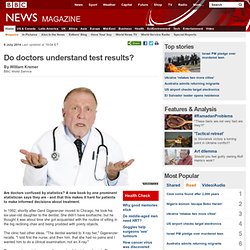

Band-Aid of the future? These high-tech bandages speed up the healing. Why Hospitals Should Let You Sleep. Ask Your Doctor These Four Questions About Any Treatment. Avoid these 3 traps when talking to someone with dementia. Why Doctors Reject Tools That Make Their Jobs Easier. I want to tell you about a brouhaha in my field over a “new” medical discipline three hundred years ago. Half my fellow doctors thought it weighed them down and wanted nothing to do with it. The other half celebrated it as a means for medicine to finally become modern, objective and scientific. Something Happened to U.S. Drug Costs in the 1990s. There was a time when America approximated other wealthy countries in drug spending.
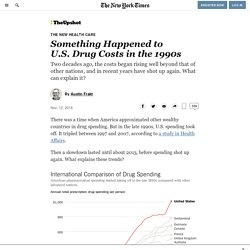
But in the late 1990s, U.S. spending took off. It tripled between 1997 and 2007, according to a study in Health Affairs. Then a slowdown lasted until about 2013, before spending shot up again. What explains these trends? By 2015, American annual spending on prescription drugs reached about $1,000 per person and 16.7 percent of overall personal health care spending. Among those, Switzerland, second to the United States, was only at $783. Several factors could be at play in America’s spending surge. In fact, when it comes to drugs primary care doctors typically prescribe — including medications for hypertension, high cholesterol, depression, gastrointestinal conditions and pain — a recent study in the journal Health Policy found that Americans use prescription drugs for 12 percent fewer days per year than their counterparts in other wealthy countries.
Image A U.S. Allergies: the scourge of modern life? To anyone from Generation X or older, it often feels like food allergies are far more common today than in their youth.

The Skeleton King, the '80s Bone Dealer Who Changed Halloween. Identify Mystery Pills With This Field Guide. Why Doctors Hate Their Computers. On a sunny afternoon in May, 2015, I joined a dozen other surgeons at a downtown Boston office building to begin sixteen hours of mandatory computer training.
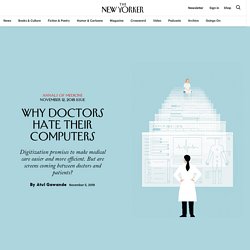
We sat in three rows, each of us parked behind a desktop computer. In one month, our daily routines would come to depend upon mastery of Epic, the new medical software system on the screens in front of us. What if the Placebo Effect Isn’t a Trick? That may seem like putting a thumb on the scale for drugs, but under the logic of the drug-approval regime, to eliminate placebo effects is not to cheat; it merely reduces the noise in order for the drug’s signal to be heard more clearly.
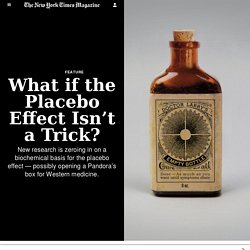
That simple logic, however, may not hold up as Hall continues her research into the genetic basis of the placebo. Indeed, that research may have deeper implications for clinical drug trials, and for the drugs themselves, than pharma companies might expect. Since 2013, Hall has been involved with the Women’s Health Study, which has tracked the cardiovascular health of nearly 40,000 women over more than 20 years. The subjects were randomly divided into four groups, following standard clinical-trial protocol, and received a daily dose of either vitamin E, aspirin, vitamin E with aspirin or a placebo. The making of an opioid epidemic. Jane Ballantyne was, at one time, a true believer.
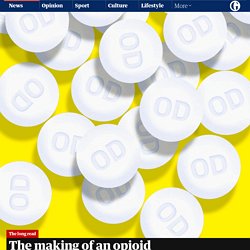
The British-born doctor, who trained as an anaesthetist on the NHS before her appointment to head the pain department at Harvard and its associated hospital, drank up the promise of opioid painkillers – drugs such as morphine and methadone – in the late 1990s. Ballantyne listened to the evangelists among her colleagues who painted the drugs as magic bullets against the scourge of chronic pain blighting millions of American lives.
Doctors such as Russell Portenoy at the Memorial Sloan Kettering Cancer Center in New York saw how effective morphine was in easing the pain of dying cancer patients thanks to the hospice movement that came out of the UK in the 1970s. In Montana, a Tough Negotiator Proved Employers Don’t… This story was co-published with NPR.
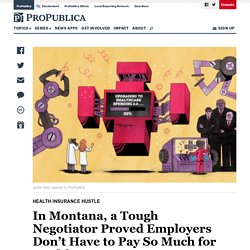
Marilyn Bartlett took a deep breath, drew herself up to her full 5 feet and a smidge, and told the handful of Montana officials that she had a radical strategy to bail out the state’s foundering benefit plan for its 30,000 employees and their families. How Medicine's Long, Thin Supply Chain Threatens Americans. Scientists have found “hidden” brain activity that can indicate if a vegetative patient is aware. The new research could help doctors to quickly identify patients who are aware despite appearing unresponsive and unable to communicate.

These images show brain networks in two behaviourally similar vegetative patients (left and middle), but the one in the middle passed the "tennis test". This patient's consciousness network is similar to that of a healthy adult (right). Image: Srivas Chennu Researchers from University of Cambridge in the UK have identified hidden networks in vegetative patients that could support consciousness, even when a patient appears to be unresponsive. Doctors Tell All—and It’s Bad - Meghan O'Rourke. A crop of books by disillusioned physicians reveals a corrosive doctor-patient relationship at the heart of our health-care crisis.

Do doctors understand test results? 6 July 2014Last updated at 19:04 ET By William Kremer BBC World Service Are doctors confused by statistics?
